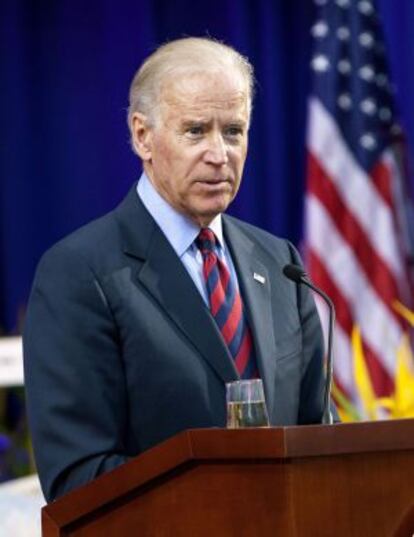US reaches out to Caribbean leaders who believe Washington doesn’t care
Vice President Biden pledges investments in renewable energies for Caricom nations

The United States on Tuesday reached out to the Caribbean Community pledging to bring more economic aid and energy cooperation to island nations, which complained that Washington has overlooked them for some time.
“We need them,” Vice President Joe Biden said after holding a meeting with Caricom leaders in Trinidad and Tobago. Biden sought to reassure the 15 presidents and prime ministers that the Obama administration wants to increase trade and investment with the small nations.
The vice president signed a Trade Investment Framework agreement that also calls for exchanges in the areas of security, education and renewable energies.
During a news conference with Trinidadian Prime Minister Kamla Persad-Bissessar, Biden said he was “here because President Obama wanted me to have a dialogue with regional leaders and because the US wants to become more deeply invested in a partnership with all the nations of the Caribbean.”
“Our search for growth, jobs, affordable supplies of energy, our fight against transnational crime and the protection of our climate and the environment—all of these issues have no respect for borders and they affect all of our borders, and affect the people of my country,” Biden said.
“President Obama and I are aware that the small nations face special economic difficulties. The cost of doing business can be higher, and goods are more expensive,” he said.
President Obama and I are aware that the small nations face special economic difficulties"
Reducing the costs of energy and increasing US participation in the regional Caricom bloc through investment in renewable energies were two points that took up much of the discussion between Biden and Caribbean leaders.
“Perhaps no other group of nations is better located than the nations of the Caribbean to take advantage of energy renewable possibilities,” the vice president said. “We know that many Caribbean nations pay three times more for energy than we do.”
Last week, the United States and Trinidad and Tobago signed a memo of understanding to set up a renewable energy research center in the islands’ capital Port-of-Spain.
Twelve of the 15 nations that form Caricom belong to the Venezuelan initiative Petrocaribe, which was created in 2005 by the late President Hugo Chávez to help the islands purchase oil from Caracas at discount rates and favorable terms. It also has served to extend Venezuela’s leftist influence in the basin.
Under the scheme, member states have 90 days to pay for 40 percent of the price for Venezuelan crude either using cash or in exchange for their exports such as beans, sugar and livestock. The remaining bill can be financed for up to 25 years at one-percent interest.
Following Chávez’s death in March, President Nicolás Maduro pledged to continue the oil-purchasing program.
Persad-Bissessar described the discussions with Biden as “at times brutal,” as the leader voiced concerns on issues such as trade and security to the notion that Washington doesn’t care about the Caribbean.
“We need you! And I hope you would find a place in your hearts, and your economics and your quest for civilization that we can play a part in,” he said.
Biden has left Trinidad and Tobago for a visit to Brazil.
Tu suscripción se está usando en otro dispositivo
¿Quieres añadir otro usuario a tu suscripción?
Si continúas leyendo en este dispositivo, no se podrá leer en el otro.
FlechaTu suscripción se está usando en otro dispositivo y solo puedes acceder a EL PAÍS desde un dispositivo a la vez.
Si quieres compartir tu cuenta, cambia tu suscripción a la modalidad Premium, así podrás añadir otro usuario. Cada uno accederá con su propia cuenta de email, lo que os permitirá personalizar vuestra experiencia en EL PAÍS.
¿Tienes una suscripción de empresa? Accede aquí para contratar más cuentas.
En el caso de no saber quién está usando tu cuenta, te recomendamos cambiar tu contraseña aquí.
Si decides continuar compartiendo tu cuenta, este mensaje se mostrará en tu dispositivo y en el de la otra persona que está usando tu cuenta de forma indefinida, afectando a tu experiencia de lectura. Puedes consultar aquí los términos y condiciones de la suscripción digital.









































